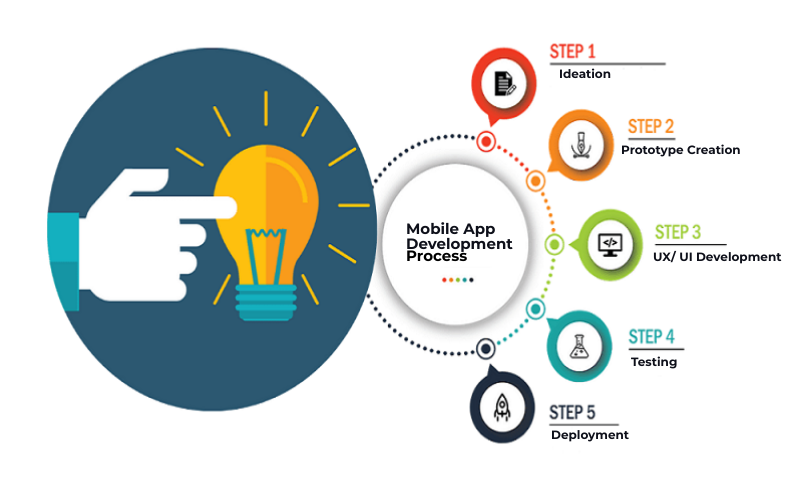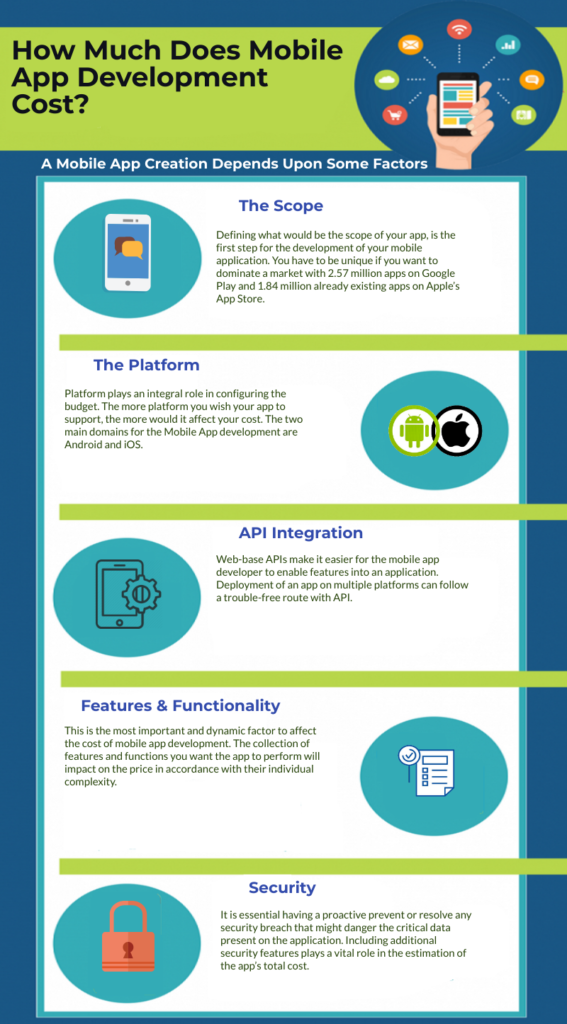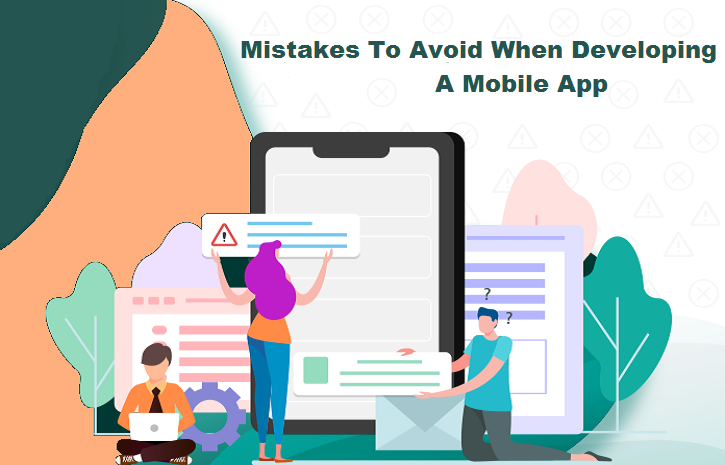Smartphones are everywhere you see. Today we are living in the era of millennials, and there are now 3.5 billion smartphone users, all around the world. We can evidently say that it would be hard imagining life without smartphones for a gigantic mass of popularity. We use smartphones for our daily chores and work. 67% browse the internet with a mobile device. Business owners have also perceived significance in the market, and have established their e-stores on the on-demand economy that is rising swiftly. This allows users to avail of a variety of services at their fingertips. From finding a job to ordering food online, mobile apps have left no stone unturned.
With this rapid endorsement of technology in the expansion of mobile app development which is predicted to cover more than 935 billion U.S. dollars in revenues via paid downloads and in-app advertising. 51.98 percent of web pages were viewed under the wrath of mobile phones, all across the globe, according to a recent survey. Why will any business leave an opportunity for this horizon?
In this guide, we will cover all the elements there are in mobile app development to help our budding business owners.
What is a Mobile Application development?
The revolution of Mobile App Development
Mobile Application development has revolutionized to a great extent. But what is it exactly?
In simple terms, it is a set of processes and procedures involved in developing software for smartphones. These apps are a package deal, providing new-age solutions to its users. Apps can either be delivered pre-installed on your phones during manufacturing platforms and another way is through web applications using server-side or client-side processing, for instance, JavaScript. This will offer you an application that is user-friendly and offers extensive features. Mobile app development is an industry that is growing at a rapid speed and expanding our opportunities in exploring new technologies.
Overwhelmed with a thought- what mobile app development can do? Well, we have created this ultimate guide just to answer all your questions regarding it.
Types of Mobile App Development
In this era of millennials, smartphones are all around us and are massively used by the young generation. Now, with the rapid expenditure of the usage of Smartphones, there are far more 3.5 billion smartphone users, by recent research of 2020. There is an app for almost everything, for both Android & iOS operating systems. With a simple click, you can direct a link to their dedicated apps. Isn’t it amazing how far things have advanced for users?
Even with the advancements of technology, mobile app development centers on Android and iOs platforms, most of the time. But there are more into mobile app development apart from these two prominent platforms. We are going to tell you the other forms that app development has to offer:
iOS App Development
We all are already lured with the exquisite Apple’s ecosystem or the devices launched by Apple. It is a big community that has drawn enough attention to users that business owners want to establish their brands on Apple’s operating system. A business that aims to amp their presence in the market usually goes for iOS apps. A mare introduction to the Apple Store can increase their brand awareness to a great extent. While building an iOS app, Swift programming language would be used and including Xcode (an apple’s integrated development environment (IDE)) will unlock many other features for your development. Apple uses an iOS SDK development kit that has essentials such as UIKit, GameKit, Pushkin, and more.
Although Apple enforces stricter rules for app developers in order to list their app in the store, with a mammoth of potential for business that iOS offers, it is widely focused on enterprises that are targeting countries with firm economies.
Android App Development
We all have heard the name “Android” when talking about mobile app development. It is an integral platform in the mobile app development industry. Recent stats assert that there are presently 2,893,125 android apps on Google play, ready to get downloaded. The platforms offer an extensive range of development tools and solutions to most app problems. These features are popular among the developers since they are user-friendly, versatile and convenient.
Many wearable devices gain extensive popularity, which helps people keep track of their health, information along with Google Assistant by your side. Wear apps are used for such devices that use Android SDL, but with different designs and functionality in accordance with the wearable device, you’re working on.
Android offers independence to apps that demand customization and open gates more than one source of revenue. Most startups and budding entrepreneurs highly recommend Android, which proves this point further.
Cross-platform App Development
As the name suggests, with cross-platform development, a business can develop an app that can run on both Android and iOS. It has a more significant impact on the development cost since codes can be reused for both platforms, which would minimize the work.
Choosing cross-platform will expand your reach to a broader audience. But like any other thing, this platform has its own downsides; the most significant one of this mobile app development is that it takes a toll on overall quality. It is always suggested by the experts to choose an adequate one for you, which is best indicated by a professional mobile app development company.
Native App Development
Native App development is explicitly created for a mobile device’s operating system(OS), separately for iOS and Android platforms. With native app development, an app would have two independent versions that’d be more compatible with each platform. The extensive features that include exemplary security, scalability, and faster overall app performance make it a preference for many experienced developers.
Progressive Web App Development
Progressive apps are seen as the future of app development since they have combined technology’s ability to blend the functions of web applications and native mobile apps. This allows PWAs to offer convenience while using techs such as HTML, CSS, and JavaScript. This is similar to accessing native-like apps with any restrictions. PWA is backed by Google, which gives this application software which makes it an essential choice for its users.
It offers reliable and intelligent caching, content updating in the background, push notifications and offline functionality to prior visited sites, which is a bonus feature of PWA. This makes the app fast, even on flaky networks. Users can enjoy jank free scrolling and seamless navigation with progressive web app development.
Hybrid App Development
Hybrid apps look like native apps, are built with JavaScript, HTML, and CSS. It offers features like fast performing applications, responsive design, offline functionality available. Hybrid is seen as an economical option as a compared native app. They use a single code base, which is easier to manage. This advantage users with faster loading pages as well.
What is the Process of Mobile App Development?

Ideation
There is a sea of apps out there when you have a solid idea that strikes as an ingenious one, go immediately to a mobile application development services and start making your app. If you want to make successful mobile applications, make sure it is unique and solves a genuine problem. Make sure of what you need and what would be the target audience for the same.
Prototype Creation
With the help of a mobile app development company, a preliminary version of the final app would be created. This would help you and the team of developers to get a salient idea about how the app would be and what needs to be modified.
UI/ UX Development
With the excellent mobile app design, the overall appearance or aesthetics of your app will be shaped. The development would define the functioning of the app. It is essential that your app looks attractive, in order to stand out from the crowd, the mobile app should be aesthetically pleasing. With the right research of what is the need and following the latest mobile app development trends, you can create a winning app.
Testing
Now that the app is designed and developed with alluring appearance and features; it needs to go through the testing phase. This will detect any malfunction before being released. The test version of the product can be released to the audience, and you can review their Feedback to work upon. Fixing the issues in the testing phase is necessary for the app to be ready for deployment.
Deployment
This is the final step for your mobile app developers since it’s finally going live. However, after the launch of the app, you should be prepared for pouring Feedback from the customers (could be a complaint). Therefore, the developer should be ready to address those and work to fix them.
Tech-stack for Mobile App Development You Should Use

We’ve got everything covered!
In this segment, we will cover the frameworks and tech-stack most used by the developer in mobile application development.
- Frameworks
- Programming language
Swift or Objective-C
If you have decided to go for building an iOS app, then Objective-C or Swift are your options for choosing a programming language. They will offer you a dynamic runtime experience, which is a super of C programming language.
Swift is relatively new as compared to Objective-C, and it has more enhanced features, such as advancement in terms of functional aspects and more error-resistant code and more. Swift is an effective and efficient tool that uses static typing making it very safe to use. It could be used on server-side development because of its performance excellence and consumes a low memory footprint.
Java & kotlin
This object-orientated programming language is used to develop an android mobile app. Java is a prominent name in the industry with an exponent open-source tools and libraries to aid developers. Kotlin is a stable and harmonious development option for Android Studio since it is a lightweight programming language as compared to java. In fact, Kotlin was designed to improve existing java models. It provides solutions to API design deficiencies.
HTML5
HTML5 is the 5th version on HTML as the same suggests, which is used to present content on the web. When HTML5 partners with JavaScript, one can create mobile apps. HTML5 has introduced markup and application Programming Interface (API). HTML5 creates a responsive design that supports all devices.
C++
C++ is the root of most programming languages that contains the ability to develop dynamic apps. It is an efficient compiler base that makes it a versatile tool that can be used on multiple platforms. Objective-C is a sister to C++, which was used to develop Apple systems, not anymore. It is a general-purpose programming language that is exquisitely used for competitive programming extensive features. It can run on a lot of platforms; a few instances are windows, Linus, Max, etc.
Framework
Cordova or PhoneGap
Ionic framwork is used to run HTML or applications that are based on Java-Script, inside a special native container on a mobile device. Native device functionality runs around JavaScript APIs and HTML-based apps. This results in making this framework access device-specific functionality like sensors, cameras and more.
PhoneGap used CSS3 apart from HTML5 and JavaScript like used in Cordova. It supports various frameworks and libraries that include jQuery, AngularJS and KnockoutJS. This framework allows combining native and hybrid code snippets, which results in creating apps that are neither completely native nor web-based mobile applications.
Flutter
Flutter has become a trending cross-platform mobile app SDK for mobile app development services, used to develop Android and iOS applications. Flutter uses DART as it’s a programming language, not JavaScript. It expediates with rapid and compelling analysis, along with facilitates UIs. It highlights and fixes bugs so fast that you won’t even realize it happened. It is a product of Google that extends a wide range of plugins backup by Google itself. And yes, apps for both eminent platforms; Android and iOS app development can happen with Flutter.
React Native
Another renowned name in the framework market- React Native, is a preferred open-sourced framework for iOS and android app development services. It allows developers to build high-performance applications within shorter development cycles with faster deployment times. React Native supports JSX, which is another reason it is preferred by both Android and ios application development services.
How Much Does Mobile App Development Cost?

We know you’ve been thinking about this question since the inception of the idea of developing a mobile app. After all, this is indeed a crucial part of which your entire mobile app journey is based on! There are a number of factors on which the cost of any mobile application development services will be estimated.
Let’s review a few of the factors that contribute to defining the cost it takes for mobile application development:
The Scope
The mobile apps deliver a higher spectrum in the market, therefore deciding the main scope of your app would be beneficial in estimating a mobile app development budget. Thus, while making a mobile application development strategy for your app, make sure to determine the niche.
You need to check if the app is intended for public use or not? If it is made for internal use only? What is the target audience? What are the demands and expectations of the expected users?
The Platform
Settling with which platform would work best for your app would be a daunting task. The features and functionality depend on the platform you decide in the developing stage of the app. You can design and develop for traditional mobile platforms- Android or iOS, but with the advancements of technology, now there can be an app for virtual assistants (Alexa or Google Home), messaging platforms, IoT products and more. With an increasing number of app-powered devices, your options are expanding. But every platform has its own sophisticated approach and expectations to meet. They are distinctive in both design and engineering. Each of the options will have different criteria for features and development, which will contribute to estimating a price for the app. In order to decide upon the best possible platform, it is recommended to hire a mobile app development company to help.
API Integration
Another essential component that has a steady hand on impacting the price of your app is the integration of a third-party service to enable a particular feature in the mobile app. Apps often use web-based APIs; in such cases, periodic maintenance of APIs is essential. There are continuous implementations of new changes in any of these applications. For instance, for any online shopping platform, the payment vendor integrates with the API to verify the payment with a user having to leave the app. You would have to develop the APIs in accordance with the complexity that is required by your mobile app, which would impact the overall cost.
Features and Functionality
Features and functions are what shape your app and play a definite role in setting the total cost of your app. The complex features & functions would be, the more costly it would take to build your app. This would also fluctuate on which mobile development company you choose—these features and what implementations would highly depend on the type and the purpose your app serves.
In addition, the app would need social media integration which will cover apps like Facebook, LinkedIn. Besides this, GPS connection and geofencing facilities are other features that are usually infused with the mobile application.
Security
Securing the data should be a priority to you since unsafe data could lose the trust of customers. Mobile app security shouldn’t be handled carelessly; otherwise, you’re risking it with hackers. Building a secure app would involve tools that help identify a vulnerability that your app might be facing. It is essential to secure the passwords, critical & sensitive details of your visitors, user data and other data linked with the mobile application. It may seem time-consuming and costly, but it is rather cost-efficient, in its future.
Testing
Another vital step to determine the cost of developing a mobile app is testing for any bugs or/and system errors. Testing is an essential point in preparing the budget for your mobile app. It would be essential to run a test before launching the app. There could be multiple tests, for instance, performance testing, functional testing, interruption testing, required to be conducted in order to keep the app running or making amendments as per the need.
Mistakes To Avoid When Developing A Mobile App

Let’s review some of the major mistakes that you need to avoid while developing a mobile application for your business.
Not considering marketing significant
Business owners that have already spent a lot on the development of their mobile app don’t consider mobile app marketing strategy as an adequate element to spend money on. Here they went wrong. According to a survey, the majority of app developers and marketers set 31% of their total app development budget solely to mobile app marketing. Marketing can help you by boosting the sales, increase your content readership, it saves cost and expand customer base. You can avail extensive benefits of marketing if you choose a profound app marketing agency.
Too Complex
The interface of a mobile app is undoubtedly important, but developing a Mobile app that is too complex to use would not really be appreciated by the users. “Less is more” an old adage that applies to the app development procedures as well. You should include features that are picked considering the target audience will serve justice to your efforts. Users should not get lost on your website and find content easily. This should be your aim while creating the UI/UX designing of the app. People want information that comes comfortably with a fuss. If your app is too complicated, people would instead switch to your user. It is always advised to consider a mobile app marketing agency to help you understand the requirements of the audience and what are the necessary features according to them.
Not reviewing Feedback
Your app is for its users; therefore, you should put great focus on what Feedback they are giving. If you fail to get their views right, your app could turn into a blunder. The customers should be considered important enough to listen to their problem after all the product is made for them, isn’t it? Make their issues a prime problem and try to solve them efficiently. If you do listen to them, they will be necessary, and that would be beneficial for your product’s sale and having a loyal clientele.
Disregarding Backend Support
Stability is vital for any app development project, for which adequate backend is essential. The apps dedicated to eCommerce mobile development or even for gaming should have a robust backend. The app should be able to handle high traffic inflow else your business might suffer from possible conversions. You should also look for a professional backend service from a mobile development company that can offer scalability to your app.



